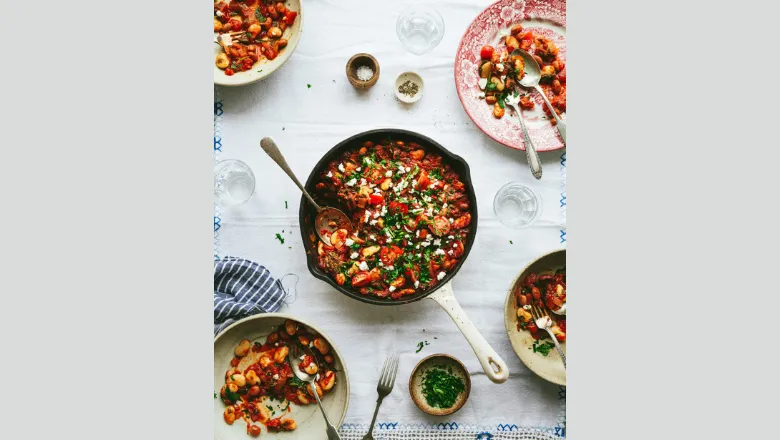This dish was inspired by the science behind not just legumes, but the importance of plant diversity for optimal gut health including polyphenol-rich herbs and spices. Our research team within the Department of Nutritional Science is looking to further understand the role of plant diversity in predicting microbial diversity and overall health.
Dr Megan Rossi, dietitian and gut-expert from the Department of Nutritional Sciences
15 February 2023
Bean-tastic! Dr Megan Rossi partners with King's Food
Renowned dietitian and gut-expert Dr Megan Rossi has partnered with King’s Food to provide deliciously healthy meals on campus based on King’s research.

Lunches filled with prebiotic legumes, microbe-made fermented dairy and roasted tomatoes packed with skin-loving lycopene are on the menu across King’s Food outlets.
Dr Rossi’s research at King’s investigates nutrition-based therapies in gut health, including pre- and probiotics, dietary fibres and food additives. This unique partnership with King’s Food ensures staff and students have access to nutritionally dense meals that not only deliver on delicious plant diversity but are underpinned by research.
The smokey beans dish, available at lunchtimes, is packed with plant diversity including three different types of beans. Beans pack quite the nutritious punch, full of fibre and protein. They are also a great source of prebiotics, which research from the Department of Nutritional Sciences has shown increases the growth of anti-inflammatory gut bacteria, such as bifidobacteria.
Legumes, including beans and pulses, are one of the most sustainable sources of protein: good for you, your microbes and the planet, and naturally gluten-free for those with coeliac disease or a gluten intolerance.
Also in the recipe are tomatoes roasted in olive oil, which has surprising health benefits.
A trial compared the impact of eating cooked tomatoes with and without olive oil for five days. Those who included the oil had significantly greater levels of the phytochemical lycopene in their blood. Lycopene has been shown to increase your skin’s defence against the sun and is linked with better heart health and a lower risk of prostate cancer. The combination of tomatoes, heat and olive oil in this dish means a higher lycopene bioavailability.
The winter warmer salad combines earthy flavours with creamy goat’s cheese, which will provide a whopping 14g of fibre per portion - nearly 50% of your daily needs. Fermented diary like goat’s cheese is a rich source of calcium and b12, which are important for digestive enzyme function and mental wellbeing, respectively. Research has also found cheese, unlike full fat milk, is protective against heart disease.
The splendid colour of beetroot doesn’t just look sensational on a plate. The phytochemical betalain, which gives the beetroot its red colour, has been shown to be a powerful antioxidant with anti-cancer properties based on animal studies.
King’s Food is also collaborating with Bio&Me, a prebiotic food brand co-founded by Dr Rossi.
She said: “Our porridge range was inspired by a landmark Lancet systematic review published in 2019 by et al. that showed for every 8g additional increase in dietary fibre per day as a population we would reduce our risk of coronary heart disease by 19%, type 2 diabetes by 15% and colorectal cancer by 8%. Each 60g serve of our apple and cinnamon Bio&Me porridge offers not only 8grams of fibre, but phytonutrients (plant chemicals) from 13 deliciously diverse plant ingredients including wholegrains, nuts, seeds, fruit and we’ve even snuck some veg in too.”
Bio&Me will be available in King’s Food cafes this month.

Megan Rossi’s prebiotic baked bean recipe
2 tbsp olive oil
1 onion, diced
3 cloves of garlic, crushed
1 tsp smoked paprika
Half a tsp cayenne pepper
1 tsp cumin seeds
1 x 400g tin of tomatoes
4 sundried tomatoes, preserved in oil
1 x 400g tin of borlotti beans, drained and rinsed
1 x 400g tin of cannellini beans, drained and rinsed
40g black olives, sliced (optional)
1 tbsp tamari or soy sauce
1 tsp sweetener of choice
1 tsp vinegar of choice
40g spinach leaves, washed (optional)
Salt and pepper
-
In a non-stick frying pan, warm the oil over a low–medium heat. Add the onion, garlic and spices and sauté for a few minutes.
-
Add the tinned tomatoes and sundried tomatoes and simmer for 15 minutes on a low heat.
-
Add in the beans, and olives, if using, and cook for a further 15 minutes.
-
Finally, add the tamari or soy sauce, sweetener, vinegar, and the spinach leaves and chilli, if using. Simmer for a few minutes. Season to taste.
-
Plate the beans and top with eggs and a dollop of yoghurt, hummus or both.
-
Sprinkle on the alfalfa sprouts, if using.
Photo & recipes from 'Eat More, Live Well' by Dr Megan Rossi (Penguin Books Ltd), available from Amazon UK
Follow Dr Megan Rossi at www.theguthealthdoctor.com @TheGutHealthDoctor

